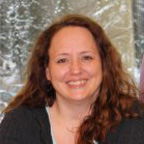- About Archives
- About SAA
- Careers
- Education
- Publications
- Advocacy
- Membership
 Professional Experience: Head, Archives & Special Collections, Consortium Library, University of Alaska Anchorage (UAA), 2007‒present. Reference Archivist, UAA, 2002‒2007. Patron Services Archivist, Utah State Archives and Records Service (USARS), 1998‒2002; Lead Reference Archivist, USARS, 1999‒2002; Cataloger, USARS, 2000‒2002. Records Archivist, Bonneville County District Court, Idaho Falls, Idaho, 1994‒1998.
Professional Experience: Head, Archives & Special Collections, Consortium Library, University of Alaska Anchorage (UAA), 2007‒present. Reference Archivist, UAA, 2002‒2007. Patron Services Archivist, Utah State Archives and Records Service (USARS), 1998‒2002; Lead Reference Archivist, USARS, 1999‒2002; Cataloger, USARS, 2000‒2002. Records Archivist, Bonneville County District Court, Idaho Falls, Idaho, 1994‒1998.
Education: MA, History/Archives and Records Management, Western Washington University, 1997. BA, History, Idaho State University, 1990.
Professional Activities: Society of American Archivists: Reference, Access, and Outreach Section (RAO) Nominations Committee Chair, 2009‒2010. RAO Chair, 2008‒2009. RAO Chair-Elect, 2007‒2008. RAO Steering Committee, 2003‒2007. Program Committee, 2006‒2007. Privacy and Confidentiality Roundtable Steering Committee, 2004‒2006. Northwest Archivists (NWA): Ad Hoc Education Committee Co-chair, 2011‒ongoing. 2008 Local Arrangements Committee Chair, 2007‒2008. 2006 Program Committee, 2005‒2006. Board member, 2003‒2005. Alaska State Historical Records Advisory Board member, 2004‒2009. Developed and taught several offerings of a two-day workshop on archival basics for allied professionals between 2003 and 2006 in Alaska and Montana (through NWA), and developed and taught a two-day workshop on job-seeking skills for archivists offered in 2011 and 2012 through NWA and Western Washington University.
Publications: Elusive archives job archival job-hunting advice blog, http://elusivearchives.blogspot.com, January‒May 2010. “The Archival Image in Fiction: An Analysis and Annotated Bibliography,” The American Archivist 62 (Spring 1999): 24‒73.
* * *
Questions posed by the Nominating Committee: Taking into account SAA’s strategic priorities, in which specific initiatives would you take a leadership role? How would you go about implementing these given the competing priorities of the organization while remaining responsive to members and their needs?
To me, the three strategic priorities are not competing, but are closely intertwined. Advocacy can enable our ability to diversify the profession; diversity can strengthen our advocacy efforts. Our ability as archivists to adapt to technological changes is increased by a diverse profession, provides tools for advocacy efforts and keeps us relevant to the current needs of society; this can only improve our advocacy voice. With a unified vision in mind, the priority that addresses most closely my experience, skills and abilities are those goals and outcomes listed under the Advocacy section of the strategic plan. We need to be able to think broadly about who is and who can become our allies in our efforts to expand, preserve, and make use of our documentary heritage: whether they be resource allocators, researchers (both current and potential), allied professionals, and then provide archivists with the support, whether it be tools, talking points, or relevant and timely information that they can use to support our professional goals. In order for the Society to remain responsive to member needs, and in fact to ensure that the strategic priorities represent the needs of the membership, I would work as actively as possible to engage archivists at all levels—new and with many years of experience—in these efforts.